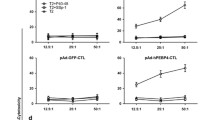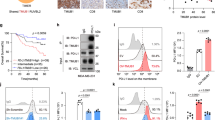Abstract
We investigated the ubiquitination and degradation of a tumor antigen, the HER-2/neu (HER-2) protooncogene product which is overexpressed in epithelial cancers. HER-2 degradation was investigated in the ovarian tumor line, SKOV3.A2, that constitutively overexpressed long-life HER-2. We used as agonist geldanamycin (GA), which initiated downmodulation of HER-2 from the cell surface. HER-2 was polyubiquitinated and degraded faster in the presence than in the absence of GA. GA did not decrease HLA-A2 expression. Presentation of the immunodominant cytotoxic T lymphocyte (CTL) epitope, E75 (369–377) from SKOV.A2 was inhibited by proteasome inhibitors, such as LLnL but was enhanced by cysteine protease inhibitors such as E64, indicating that both the proteasome and cysteine proteases are involved in epitope formation but have different effects. Enhanced tumor recognition was not an immediate or early effect of GA treatment, but was evident after 20 h of GA treatment. In contrast, 20 h GA treatment did not increase tumor sensitivity to LAK cell lysis. Twenty hour GA-treated SKOV3.A2 cells expressed an unstable HER-2 protein synthesized in the presence of GA, of faster electrophoretic mobility than control HER-2. This suggested that the newly synthesized HER-2 in the presence of GA was the main source of epitopes recognized by CTL. Twenty hour GA-treated SKOV3.A2 cells were better inducers of CTL activity directed to a number of HER-2 CTL epitopes, in peripheral blood mononuclear cells compared with control untreated SKOV3.A2 cells. Thus, induction of HER-2 protein instability enhanced the sensitivity of tumor for CTL lysis. Increased HER-2 CTL epitopes presentation may have implications for overcoming the poor immuno-genicity of human tumors, and design of epitope precursors for cancer vaccination.
Similar content being viewed by others
References
Speiser DE, Miranda R, Zakarian A, Bachmann MF, McKall-Faienza K, Odermatt B, Hanahan D, Zinkernagel RM, Ohashi PS: Self-antigens expressed by solid tumor do not efficiently stimulate naive or activated T cells: Implications for immunotherapy. J Exp Med 186: 645–653, 1997
Onrust SV, Hartl PM, Rosen SD, Hanahan D: Modulation of L-selectin ligand expression during an immune response accompanying tumorigenesis in transgenic mice. J Clin Invest 97: 54–64, 1996
O'Connell J, Sullivan GC, Collins JK, Shanahan F: The Fas counterattack: Fas-mediated T cell killing by colon cancer cells expressing Fas ligand. J Exp Med 184: 1075–1082, 1996
Seung LP, Rowley DA, Dubey P, Schreiber H: Synergy between T cell immunity and inhibition of paracrine stimulation causes tumor rejection. Proc Natl Acad Sci USA 92: 6254–6258, 1995
Kono K, Halapi E, Hising C, Petersson M, Gerdin E, Vanky F, Kiessling R: Mechanisms of escape from CD8+ T cell clones specific for the HER-2/neu proto-oncogene expressed in ovarian carcinomas: Related and unrelated to decreased MHC class 1 expression. Int J Cancer 70: 112–119, 1997
Maeurer MJ, Gollin SM, Martin D, Swaney W, Bryant J, Castelli C, Robbins P, Parmiani G, Storkus WJ, Lotze MT: Tumor escape from immune recognition: Lethal recurrent melanoma in a patient associated with downregulation of the peptide transporter protein TAP-1 and loss of expression of the immunodominant MART-1/Melan-A antigen. J Clin Invest 98: 1633–1641, 1996
Wick M, Dubey P, Doeppen H, Siegel CT, Fields PE, Chen L, Bluestone JA, Schreiber H: Antigenic cancer cells grow progressively in immune hosts without evidence for T cell exhaustion or systemic energy. J Exp Med 186: 229–238, 1997
Michalek M, Grant EP, Gramm C, Goldberg KL, Rock KL: A role for the ubiquitin-dependent proteolytic pathway in MHC class I-restricted antigen presentation. Nature 363: 552, 1993
Cox JH, Galardy P, Bennink JR, Yewdell JW: Presentation of endogenous and exogenous antigens is not affected by inactivation of e1 ubiquitin-activating enzyme in temperature-sensitive cell lines. J Immunol 154: 511–519, 1995
Rock KL, Gramm C, Rothstein L, Clark K, Stein R, Dick L, Hwang D, Goldberg KL: Inhibitors of the proteasome block the degradation of most cell proteins and the generation of peptides presented on MHC class I. Cell 78: 761–771, 1994
Yewdell JW, Anton LC, Bennink JR: Defective ribosomal products (DRiPs): A major source of antigenic peptides for MHC class I molecules? J Immunol 157: 1823–1826, 1996
Pickaut CB: Targeting of substrates to the 26S proteasome. FASEB J 11: 1055–1066, 1997
Hicke L: Ubiquitin-dependent internalization and down-regulation of plasma membrane proteins. FASEB J 11: 1215–1226, 1997
Vinitsky A, Anton LC, Snyder HL, Orlowski M, Bennink JR, Yewdell JW: Generation of MHC class I-associated peptides is only partially inhibited by proteasome inhibitors. Involvement of nonproteasomal cytosolic proteases in antigen processing. J Immunol 159: 554–564, 1997
Lopez D, Del Val M: Selective involvement of proteasome and cysteine proteases in MHC class I antigen presentation. J Immunol 159: 5769–5772, 1997
Craiu A, Akopian T, Goldberg A, Rock KL: Two distinct proteolytic processes in the generation of a major histocompatibility complex class I-presented peptide. Proc Natl Acad Sci USA 94: 10850–10855, 1997
Kupio T, Kankaanranta A, Jalava P, Kronqvist K, Kotkansala T, Weber E, Collan Y: Cystein proteinase inhibitor cystatin A in breast cancer. Cancer Res 58: 432–436, 1998
Pasleau F, Grooteclaes M, Gol-Winkler R: Expression of the c-erbB2 gene in the BT474 human mammary tumor cell line: Measurement of c-erbB2 mRNA half-life. Oncogene 8: 849–854, 1993
Mimnaugh EG, Chavany C, Neckers L: Polyubiquitination and proteasomal degradation of the p185 receptor protein-tyrosine kinase induced by geldanamycin. J Biol Chem 271: 22796–22801, 1996
Chavany C, Mimnaugh E, Miller P, Bitton R, Nguyen P, Trepel J, Whitesell L, Schnur R, Moyer JD, Neckers L: p185erbB2 binds to grp94 in vivo. J Biol Chem 271: 4974–4977, 1996
Hartmann F, Horak EM, Cho C, Lupu R, Bolen JB, Stetler-Stevenson A, Pfreundschuh M, Waldmann TA, Horak ID: Effects of the tyrosine-kinase inhibitor geldanamycin on ligand-induced HER-2/neu activation, receptor expression and proliferation of HER-2-positive malignant cell lines. Intl J Cancer 70: 221–229, 1997
Fisk B, Blevins TL, Wharton JT, Ioannides GC: Identification of an immunodominant peptide of HER-2/neu proto-oncogene recognized by ovarian tumor specific CTL lines. J Exp Med 181: 2109–2117, 1995
Quyang X, Gulliford, Zhang H, Huang GC, Epstein R: Human cancer cells exhibit PKC-dependent c-erb-2 transmodulation that correlates with phosphatase sensitivity and kinase activity. J Biol Chem 271: 21786–21792, 1996
Ward NE, Gravitt KR, O'Brien CA: Irreversible inactivation of protein kinase C by a peptide-substrate analog. J Biol Chem 270: 8056–8060, 1995
Schuler G, Steinman RM: Dendritic cells as adjuvants for immune-mediated resistance to tumors. J Exp Med 186: 1183–1187, 1997
Anderson BW, Peoples GE, Murray JL, Gershenson DM, Ioannides CG: Peptide priming of cytolytic activity to HER-2 epitope (369-377) in healthy individuals. Clin Cancer Res (in press)
Yang B, Hahn YS, Hahn CS, Braciale TJ: The requirement for proteasome activity in class I MHC antigen presentation is dictated by the length of preprocessed antigen. J Exp Med 183: 1545–1552, 1996
Fisk B, Chesak B, Wharton JT, Ioannides CG: Sequence motifs of human HER-2 proto-oncogene important for peptide binding to HLA-A2. Int J Oncol 5: 51–63, 1994
Kundig TM, Shahinian A, Kawai K, Mittrucker HW, Sebzda E, Bachmann MF, Mak TW, Ohashi PS: Duration of TCR stimulation determines costimulatory requirement of T cells. Immunity 5: 41–52, 1996
Kundig TM, Backmann MF, Oehen S, Hoffman UW, Simard TJ, Kalberer CP, Pircher H, Ohashi PS, Hengartner H, Zikernagel RM: On the role of antigen in maintaining cytotoxic T cell memory. Proc Natl Acad Sci USA 93: 9716–9723, 1996
Cai Z, Sprent J: Influence of antigen dose and costimulation on the primary response of CD8+ T cells in vitro. J Exp Med 183: 2247–2257, 1996
Ioannides CG, Fisk B, Fan D, Biddison WA, Wharton JT, O'Brien CA: Cytotoxic T cells isolated from ovarian malignant ascites recognize a peptide derived from the HER2/neu proto-oncogene. Cell Immunol 150: 225–234, 1993
Rongcun Y, Salazar-Onfray F, Charo J, Malmberg KJ, Evrin K, Maes H, Kono K, Hising C, Petersson M, Larsson O, Lan L, Appella E, Sette A, Celis E, Kiessling R: Identification of new HER-2/neu-derived peptide epitopes that can elicit specific CTL against autologous and allogeneic carcinomas and melanomas. J Immunol 163: 1037–1044, 1999
Disis ML, Smith JW, Murphy RE, Chen W, Cheever MA: In vitro generation of human cytolytic T-cells specific for peptides derived from the HER-2/neu protooncogene protein. Cancer Res 54: 1071–1076, 1994
Goth S, Nguyen V, Shastri N: Generation of naturally processed peptide/MHC class I complexes is independent of the stability of endogenously synthesized precursors. J Immunol 157: 1894–1904, 1996
Grant EP, Michalek MT, Goldberg AL, Rock KL: Rate of antigen degradation by the ubiquitin-proteasome pathway influences MHC class I presentation. J Immunol 155: 3750–3758, 1995
Tobery W, Siliciano RF: Targeting of HIV-1 antigens for rapid intracellular degradation enhances cytotoxic T lymphocyte (CTL) recognition and the induction of de novo CTL responses in vivo after immunization. J Exp Med 185: 909–920, 1997
Peles E, Ben-Levy R, Tzahar E, Liu N, Wen D, Yarden Y: Cell-type specific interaction of Neu differentiation factor (NDF/heregulin) with Neu/HER-2 suggests complex ligand-receptor relationships. EMBO J 12: 961–971, 1993
Chen W, Khilko S, Fecondo J, Margulies DH, McCluskey J: Determinant selection of MHC class I-restricted antigenic peptides is explained by class I-peptide affinity and is strongly influenced by nondominant anchor residues. J Exp Med 180: 1471–1483, 1996
Alexander-Miller M, Leggatt GR, Sarin A, Berzofsky JA: Role of antigen, CD8, and cytotoxic T lymphocyte (CTL0 avidity in high dose antigen induction of apoptosis of effector CTL. J Exp Med 184: 485–492, 1996
Houghton A: Cancer antigens: Immune recognition of self and altered self. J Exp Med 180: 35–42, 1994
Lenschow DJ, Walunas TL, Bluestone JA: CD28/B7 system of cell costimulation. Annu Rev Immunol 14: 233–258, 1996
Suzuki I, Fink P: Maximal proliferation of cytotoxic T lymphocytes requires reverse signaling through fas ligand. J Exp Med 187: 123–128, 1998
Valitutti S, Muller S, Dessing M, Lanzavecchia A: Different responses are elicited in cytotoxic T lymphocytes by different levels of T cell receptor occupancy. J Exp Med 183: 1917–1921, 1996
Author information
Authors and Affiliations
Rights and permissions
About this article
Cite this article
Castilleja, A., Ward, N.E., O'Brian, C.A. et al. Accelerated HER-2 degradation enhanced ovarian tumor recognition by CTL. Implications for tumor immunogenicity. Mol Cell Biochem 217, 21–33 (2001). https://doi.org/10.1023/A:1007267814251
Issue Date:
DOI: https://doi.org/10.1023/A:1007267814251




